Organizational Behavior Assignment: Leadership, Motivation, Teamwork
VerifiedAdded on 2020/03/23
|7
|1693
|60
Homework Assignment
AI Summary
This organizational behavior assignment addresses key aspects of leadership, motivation, teamwork, and delegation. The first task contrasts trait and behavioral theories of leadership, discussing how organizations can develop effective leaders by identifying and nurturing individuals with strong communication and interpersonal skills. The second task focuses on employee motivation, emphasizing the importance of fair compensation, career development opportunities, and a positive work environment. The third task analyzes the television series "Revenge", exploring how personal beliefs, values, and past experiences can shape differing opinions on media content. The fourth task examines the elements of successful teamwork, highlighting the importance of team size, structure, and well-managed operations. Finally, the fifth task explores the delegation of projects, emphasizing the types of projects that should be delegated and the importance of maintaining control while avoiding the over-control of delegated tasks. The assignment provides a comprehensive overview of these interconnected organizational behavior concepts.
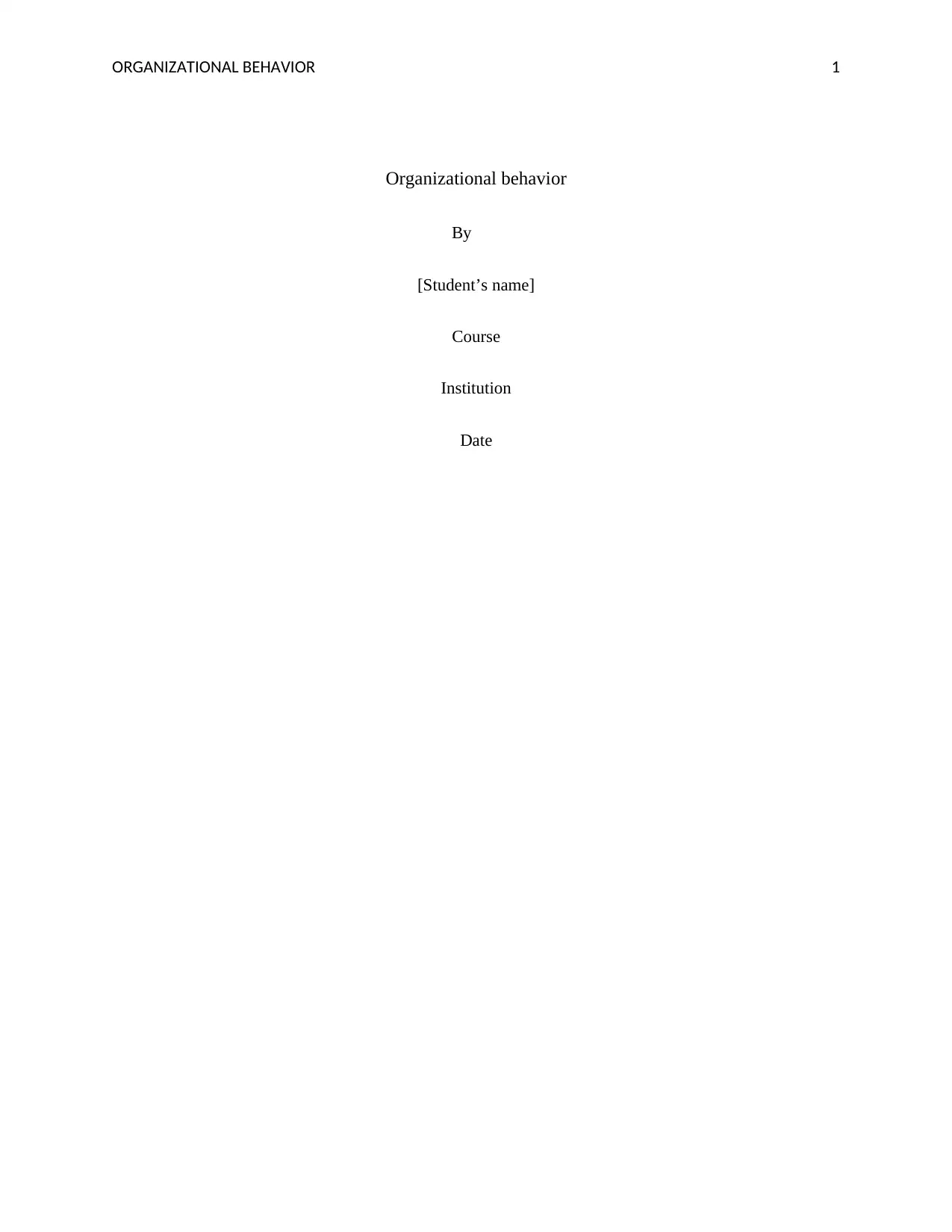
ORGANIZATIONAL BEHAVIOR 1
Organizational behavior
By
[Student’s name]
Course
Institution
Date
Organizational behavior
By
[Student’s name]
Course
Institution
Date
Paraphrase This Document
Need a fresh take? Get an instant paraphrase of this document with our AI Paraphraser
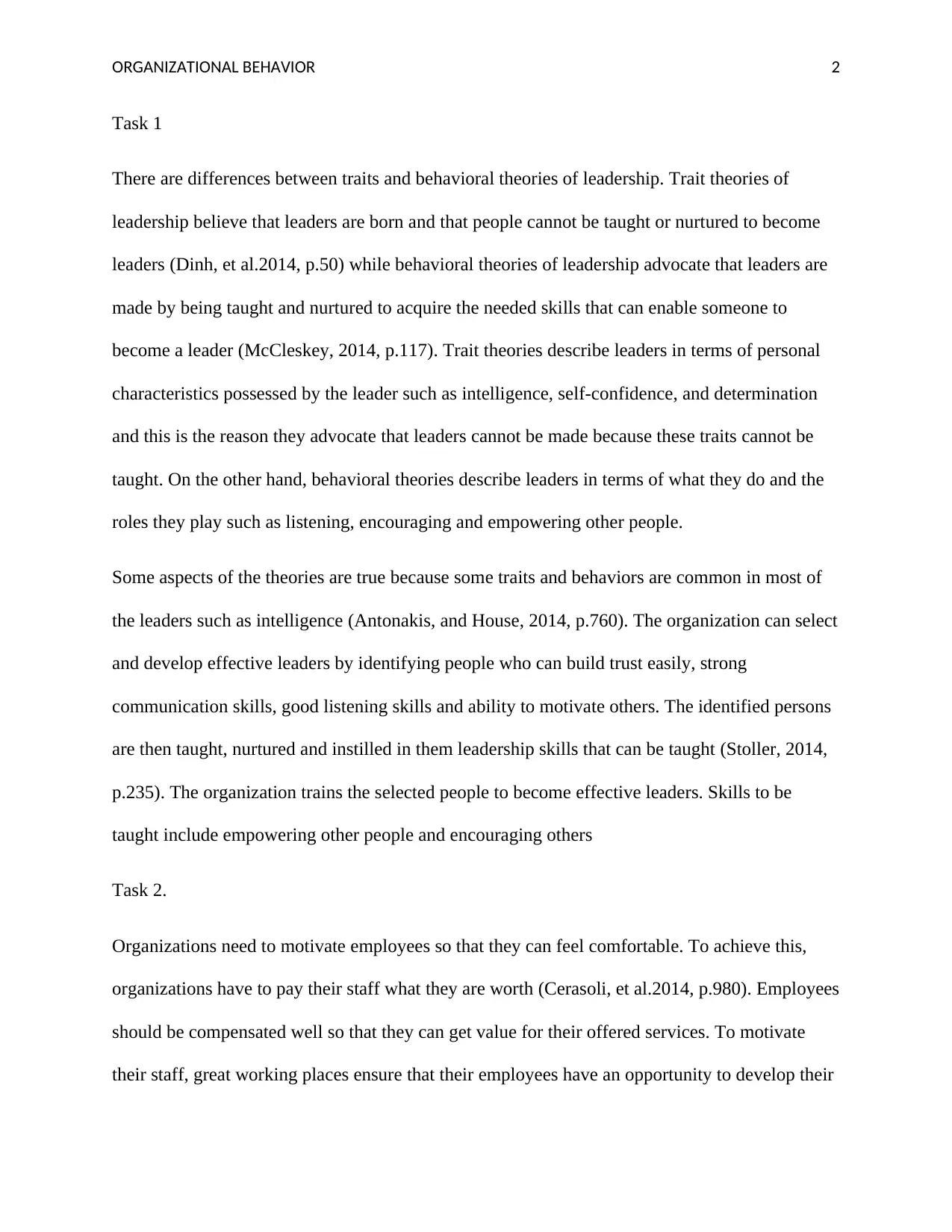
ORGANIZATIONAL BEHAVIOR 2
Task 1
There are differences between traits and behavioral theories of leadership. Trait theories of
leadership believe that leaders are born and that people cannot be taught or nurtured to become
leaders (Dinh, et al.2014, p.50) while behavioral theories of leadership advocate that leaders are
made by being taught and nurtured to acquire the needed skills that can enable someone to
become a leader (McCleskey, 2014, p.117). Trait theories describe leaders in terms of personal
characteristics possessed by the leader such as intelligence, self-confidence, and determination
and this is the reason they advocate that leaders cannot be made because these traits cannot be
taught. On the other hand, behavioral theories describe leaders in terms of what they do and the
roles they play such as listening, encouraging and empowering other people.
Some aspects of the theories are true because some traits and behaviors are common in most of
the leaders such as intelligence (Antonakis, and House, 2014, p.760). The organization can select
and develop effective leaders by identifying people who can build trust easily, strong
communication skills, good listening skills and ability to motivate others. The identified persons
are then taught, nurtured and instilled in them leadership skills that can be taught (Stoller, 2014,
p.235). The organization trains the selected people to become effective leaders. Skills to be
taught include empowering other people and encouraging others
Task 2.
Organizations need to motivate employees so that they can feel comfortable. To achieve this,
organizations have to pay their staff what they are worth (Cerasoli, et al.2014, p.980). Employees
should be compensated well so that they can get value for their offered services. To motivate
their staff, great working places ensure that their employees have an opportunity to develop their
Task 1
There are differences between traits and behavioral theories of leadership. Trait theories of
leadership believe that leaders are born and that people cannot be taught or nurtured to become
leaders (Dinh, et al.2014, p.50) while behavioral theories of leadership advocate that leaders are
made by being taught and nurtured to acquire the needed skills that can enable someone to
become a leader (McCleskey, 2014, p.117). Trait theories describe leaders in terms of personal
characteristics possessed by the leader such as intelligence, self-confidence, and determination
and this is the reason they advocate that leaders cannot be made because these traits cannot be
taught. On the other hand, behavioral theories describe leaders in terms of what they do and the
roles they play such as listening, encouraging and empowering other people.
Some aspects of the theories are true because some traits and behaviors are common in most of
the leaders such as intelligence (Antonakis, and House, 2014, p.760). The organization can select
and develop effective leaders by identifying people who can build trust easily, strong
communication skills, good listening skills and ability to motivate others. The identified persons
are then taught, nurtured and instilled in them leadership skills that can be taught (Stoller, 2014,
p.235). The organization trains the selected people to become effective leaders. Skills to be
taught include empowering other people and encouraging others
Task 2.
Organizations need to motivate employees so that they can feel comfortable. To achieve this,
organizations have to pay their staff what they are worth (Cerasoli, et al.2014, p.980). Employees
should be compensated well so that they can get value for their offered services. To motivate
their staff, great working places ensure that their employees have an opportunity to develop their
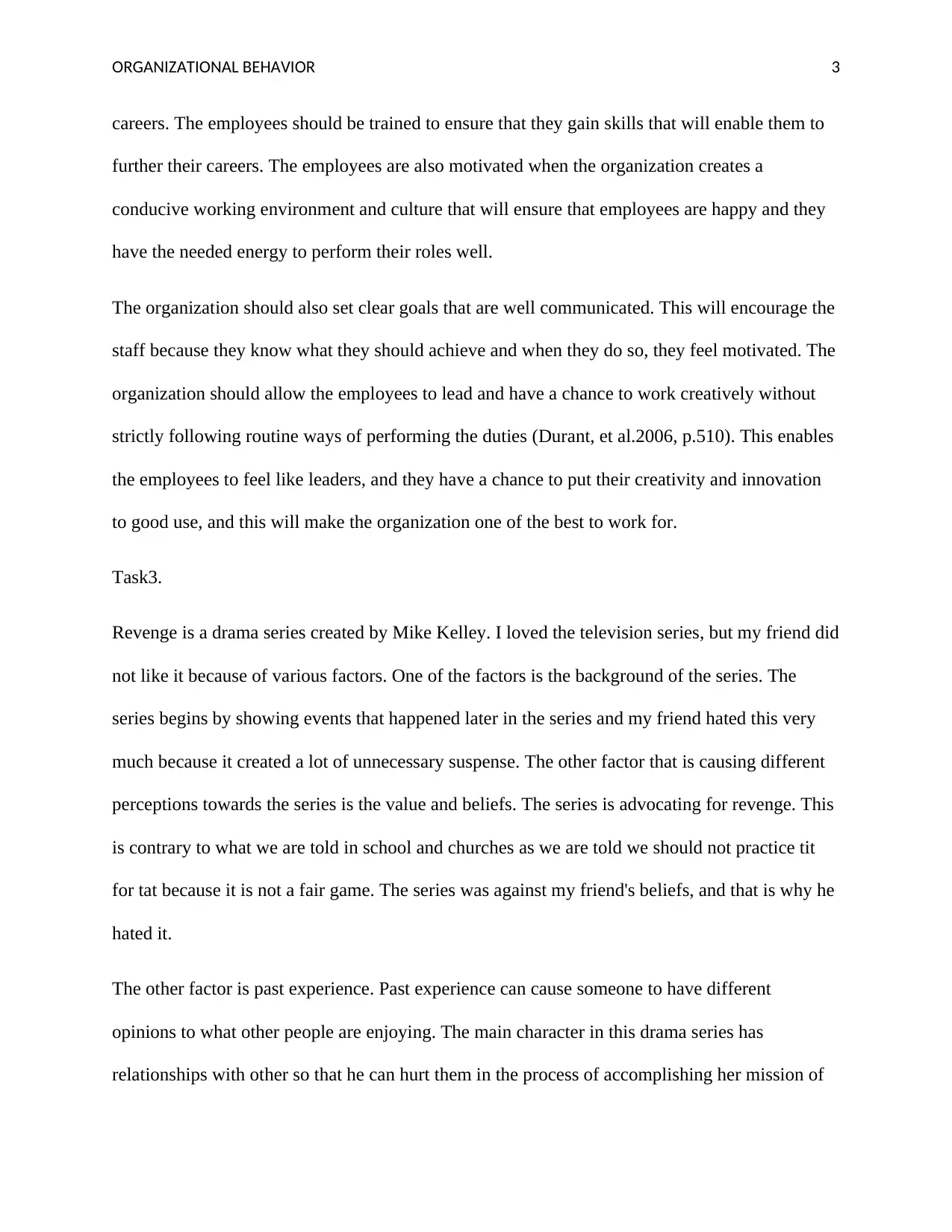
ORGANIZATIONAL BEHAVIOR 3
careers. The employees should be trained to ensure that they gain skills that will enable them to
further their careers. The employees are also motivated when the organization creates a
conducive working environment and culture that will ensure that employees are happy and they
have the needed energy to perform their roles well.
The organization should also set clear goals that are well communicated. This will encourage the
staff because they know what they should achieve and when they do so, they feel motivated. The
organization should allow the employees to lead and have a chance to work creatively without
strictly following routine ways of performing the duties (Durant, et al.2006, p.510). This enables
the employees to feel like leaders, and they have a chance to put their creativity and innovation
to good use, and this will make the organization one of the best to work for.
Task3.
Revenge is a drama series created by Mike Kelley. I loved the television series, but my friend did
not like it because of various factors. One of the factors is the background of the series. The
series begins by showing events that happened later in the series and my friend hated this very
much because it created a lot of unnecessary suspense. The other factor that is causing different
perceptions towards the series is the value and beliefs. The series is advocating for revenge. This
is contrary to what we are told in school and churches as we are told we should not practice tit
for tat because it is not a fair game. The series was against my friend's beliefs, and that is why he
hated it.
The other factor is past experience. Past experience can cause someone to have different
opinions to what other people are enjoying. The main character in this drama series has
relationships with other so that he can hurt them in the process of accomplishing her mission of
careers. The employees should be trained to ensure that they gain skills that will enable them to
further their careers. The employees are also motivated when the organization creates a
conducive working environment and culture that will ensure that employees are happy and they
have the needed energy to perform their roles well.
The organization should also set clear goals that are well communicated. This will encourage the
staff because they know what they should achieve and when they do so, they feel motivated. The
organization should allow the employees to lead and have a chance to work creatively without
strictly following routine ways of performing the duties (Durant, et al.2006, p.510). This enables
the employees to feel like leaders, and they have a chance to put their creativity and innovation
to good use, and this will make the organization one of the best to work for.
Task3.
Revenge is a drama series created by Mike Kelley. I loved the television series, but my friend did
not like it because of various factors. One of the factors is the background of the series. The
series begins by showing events that happened later in the series and my friend hated this very
much because it created a lot of unnecessary suspense. The other factor that is causing different
perceptions towards the series is the value and beliefs. The series is advocating for revenge. This
is contrary to what we are told in school and churches as we are told we should not practice tit
for tat because it is not a fair game. The series was against my friend's beliefs, and that is why he
hated it.
The other factor is past experience. Past experience can cause someone to have different
opinions to what other people are enjoying. The main character in this drama series has
relationships with other so that he can hurt them in the process of accomplishing her mission of
⊘ This is a preview!⊘
Do you want full access?
Subscribe today to unlock all pages.

Trusted by 1+ million students worldwide

ORGANIZATIONAL BEHAVIOR 4
revenge. My friend experienced such cruelty from someone else, and he was very hurt. The
drama advocates for what my friend hates and that may be the reason he does not like the film.
Task 4.
The elements identified for successful teamwork are true. For instance keeping a small team with
consistent membership is very important as this will make the team be manageable and be well
coordinated (Weller, et al.2014, p.152). This coordination will enable the team to have effective
team performance .other conditions for making the team to be successful is to have enabling
team structures. This will help the team to be motivated and feel valued. This will encourage
them to take responsibilities and also be able to receive feedback based on their efforts (Weaver,
et al.2014, p.366). The other conditions that the team operations should be well managed to
ensure there is the availability of the needed resources, team information and even team
education.
The steps to take in early team’s life include setting the vision and picture of the work to be
done. This will be followed by setting up the common goal of the team, then knowing the team
members and their capabilities. The next step will be to define roles to each team member to
avoid conflicts in the team (Hurlburt, et al.2014, p.165). The next step will be planning how the
goals of the team will be achieved. After this, as a leader will be required to communicate to the
team concerning team goals, instructions, and roles of each member. The last step will be to find
the correct tools to manage the team.
Task 5.
The projects to be delegated are the one which does not form creative core of the business. Core
projects to the business should not be delegated because any mistake will harm the business
revenge. My friend experienced such cruelty from someone else, and he was very hurt. The
drama advocates for what my friend hates and that may be the reason he does not like the film.
Task 4.
The elements identified for successful teamwork are true. For instance keeping a small team with
consistent membership is very important as this will make the team be manageable and be well
coordinated (Weller, et al.2014, p.152). This coordination will enable the team to have effective
team performance .other conditions for making the team to be successful is to have enabling
team structures. This will help the team to be motivated and feel valued. This will encourage
them to take responsibilities and also be able to receive feedback based on their efforts (Weaver,
et al.2014, p.366). The other conditions that the team operations should be well managed to
ensure there is the availability of the needed resources, team information and even team
education.
The steps to take in early team’s life include setting the vision and picture of the work to be
done. This will be followed by setting up the common goal of the team, then knowing the team
members and their capabilities. The next step will be to define roles to each team member to
avoid conflicts in the team (Hurlburt, et al.2014, p.165). The next step will be planning how the
goals of the team will be achieved. After this, as a leader will be required to communicate to the
team concerning team goals, instructions, and roles of each member. The last step will be to find
the correct tools to manage the team.
Task 5.
The projects to be delegated are the one which does not form creative core of the business. Core
projects to the business should not be delegated because any mistake will harm the business
Paraphrase This Document
Need a fresh take? Get an instant paraphrase of this document with our AI Paraphraser
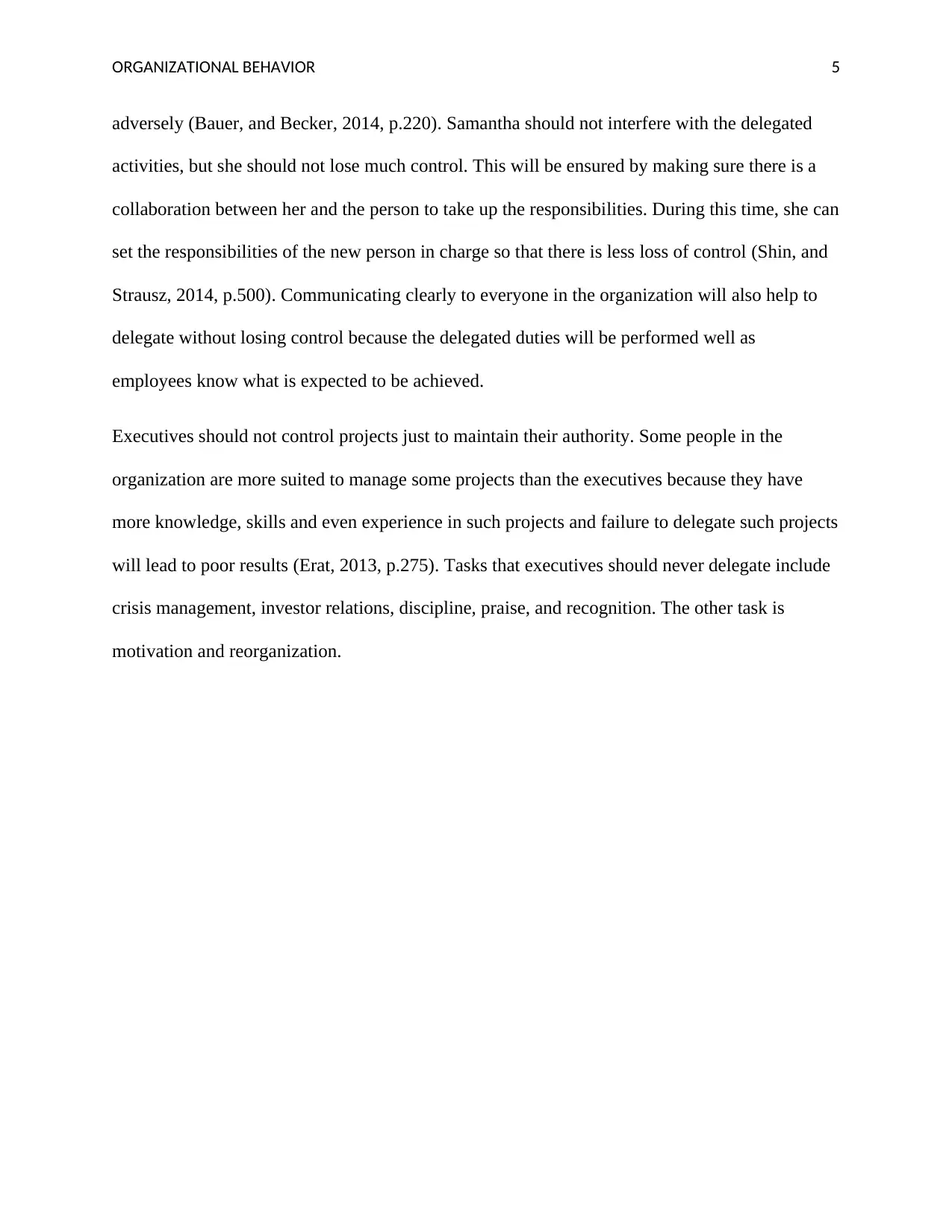
ORGANIZATIONAL BEHAVIOR 5
adversely (Bauer, and Becker, 2014, p.220). Samantha should not interfere with the delegated
activities, but she should not lose much control. This will be ensured by making sure there is a
collaboration between her and the person to take up the responsibilities. During this time, she can
set the responsibilities of the new person in charge so that there is less loss of control (Shin, and
Strausz, 2014, p.500). Communicating clearly to everyone in the organization will also help to
delegate without losing control because the delegated duties will be performed well as
employees know what is expected to be achieved.
Executives should not control projects just to maintain their authority. Some people in the
organization are more suited to manage some projects than the executives because they have
more knowledge, skills and even experience in such projects and failure to delegate such projects
will lead to poor results (Erat, 2013, p.275). Tasks that executives should never delegate include
crisis management, investor relations, discipline, praise, and recognition. The other task is
motivation and reorganization.
adversely (Bauer, and Becker, 2014, p.220). Samantha should not interfere with the delegated
activities, but she should not lose much control. This will be ensured by making sure there is a
collaboration between her and the person to take up the responsibilities. During this time, she can
set the responsibilities of the new person in charge so that there is less loss of control (Shin, and
Strausz, 2014, p.500). Communicating clearly to everyone in the organization will also help to
delegate without losing control because the delegated duties will be performed well as
employees know what is expected to be achieved.
Executives should not control projects just to maintain their authority. Some people in the
organization are more suited to manage some projects than the executives because they have
more knowledge, skills and even experience in such projects and failure to delegate such projects
will lead to poor results (Erat, 2013, p.275). Tasks that executives should never delegate include
crisis management, investor relations, discipline, praise, and recognition. The other task is
motivation and reorganization.
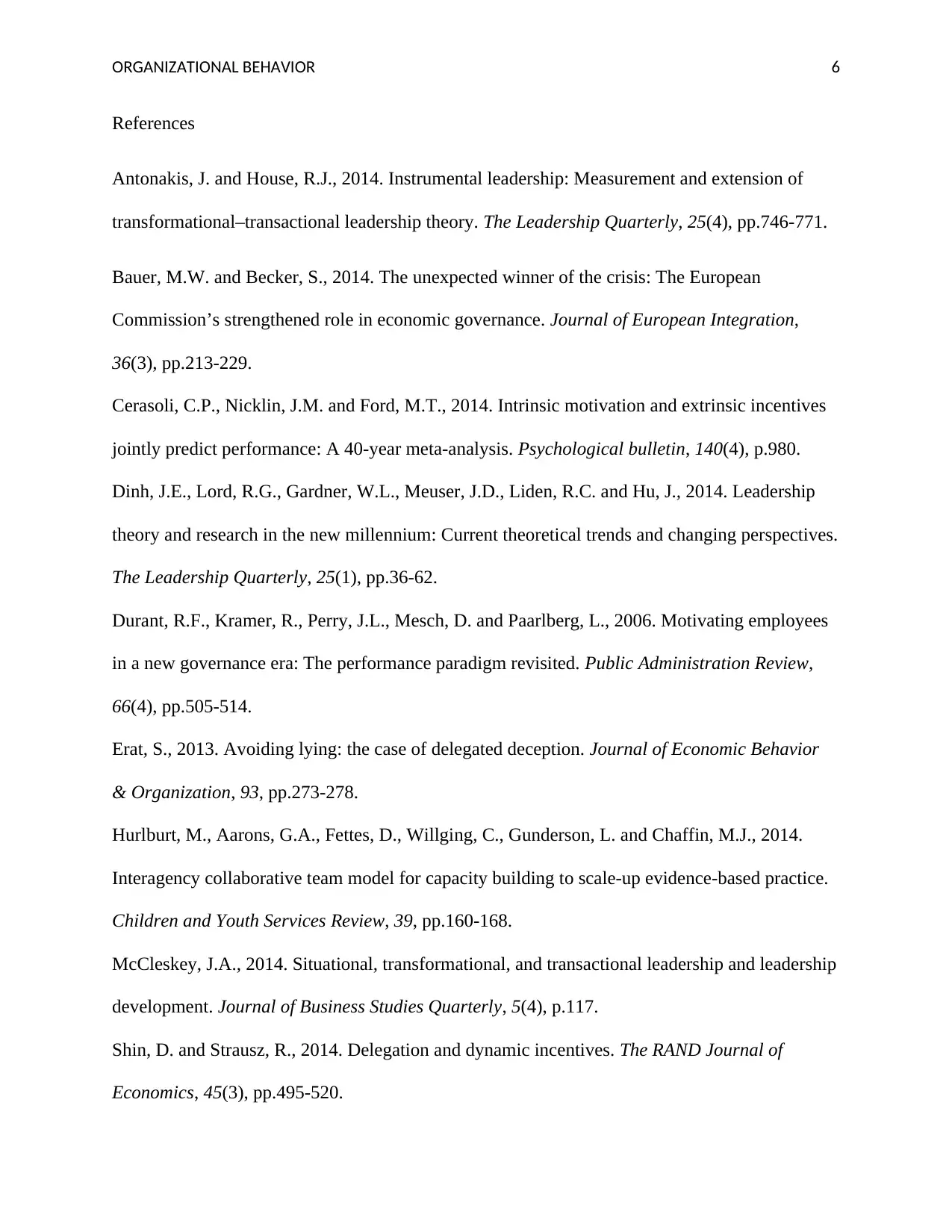
ORGANIZATIONAL BEHAVIOR 6
References
Antonakis, J. and House, R.J., 2014. Instrumental leadership: Measurement and extension of
transformational–transactional leadership theory. The Leadership Quarterly, 25(4), pp.746-771.
Bauer, M.W. and Becker, S., 2014. The unexpected winner of the crisis: The European
Commission’s strengthened role in economic governance. Journal of European Integration,
36(3), pp.213-229.
Cerasoli, C.P., Nicklin, J.M. and Ford, M.T., 2014. Intrinsic motivation and extrinsic incentives
jointly predict performance: A 40-year meta-analysis. Psychological bulletin, 140(4), p.980.
Dinh, J.E., Lord, R.G., Gardner, W.L., Meuser, J.D., Liden, R.C. and Hu, J., 2014. Leadership
theory and research in the new millennium: Current theoretical trends and changing perspectives.
The Leadership Quarterly, 25(1), pp.36-62.
Durant, R.F., Kramer, R., Perry, J.L., Mesch, D. and Paarlberg, L., 2006. Motivating employees
in a new governance era: The performance paradigm revisited. Public Administration Review,
66(4), pp.505-514.
Erat, S., 2013. Avoiding lying: the case of delegated deception. Journal of Economic Behavior
& Organization, 93, pp.273-278.
Hurlburt, M., Aarons, G.A., Fettes, D., Willging, C., Gunderson, L. and Chaffin, M.J., 2014.
Interagency collaborative team model for capacity building to scale-up evidence-based practice.
Children and Youth Services Review, 39, pp.160-168.
McCleskey, J.A., 2014. Situational, transformational, and transactional leadership and leadership
development. Journal of Business Studies Quarterly, 5(4), p.117.
Shin, D. and Strausz, R., 2014. Delegation and dynamic incentives. The RAND Journal of
Economics, 45(3), pp.495-520.
References
Antonakis, J. and House, R.J., 2014. Instrumental leadership: Measurement and extension of
transformational–transactional leadership theory. The Leadership Quarterly, 25(4), pp.746-771.
Bauer, M.W. and Becker, S., 2014. The unexpected winner of the crisis: The European
Commission’s strengthened role in economic governance. Journal of European Integration,
36(3), pp.213-229.
Cerasoli, C.P., Nicklin, J.M. and Ford, M.T., 2014. Intrinsic motivation and extrinsic incentives
jointly predict performance: A 40-year meta-analysis. Psychological bulletin, 140(4), p.980.
Dinh, J.E., Lord, R.G., Gardner, W.L., Meuser, J.D., Liden, R.C. and Hu, J., 2014. Leadership
theory and research in the new millennium: Current theoretical trends and changing perspectives.
The Leadership Quarterly, 25(1), pp.36-62.
Durant, R.F., Kramer, R., Perry, J.L., Mesch, D. and Paarlberg, L., 2006. Motivating employees
in a new governance era: The performance paradigm revisited. Public Administration Review,
66(4), pp.505-514.
Erat, S., 2013. Avoiding lying: the case of delegated deception. Journal of Economic Behavior
& Organization, 93, pp.273-278.
Hurlburt, M., Aarons, G.A., Fettes, D., Willging, C., Gunderson, L. and Chaffin, M.J., 2014.
Interagency collaborative team model for capacity building to scale-up evidence-based practice.
Children and Youth Services Review, 39, pp.160-168.
McCleskey, J.A., 2014. Situational, transformational, and transactional leadership and leadership
development. Journal of Business Studies Quarterly, 5(4), p.117.
Shin, D. and Strausz, R., 2014. Delegation and dynamic incentives. The RAND Journal of
Economics, 45(3), pp.495-520.
⊘ This is a preview!⊘
Do you want full access?
Subscribe today to unlock all pages.

Trusted by 1+ million students worldwide
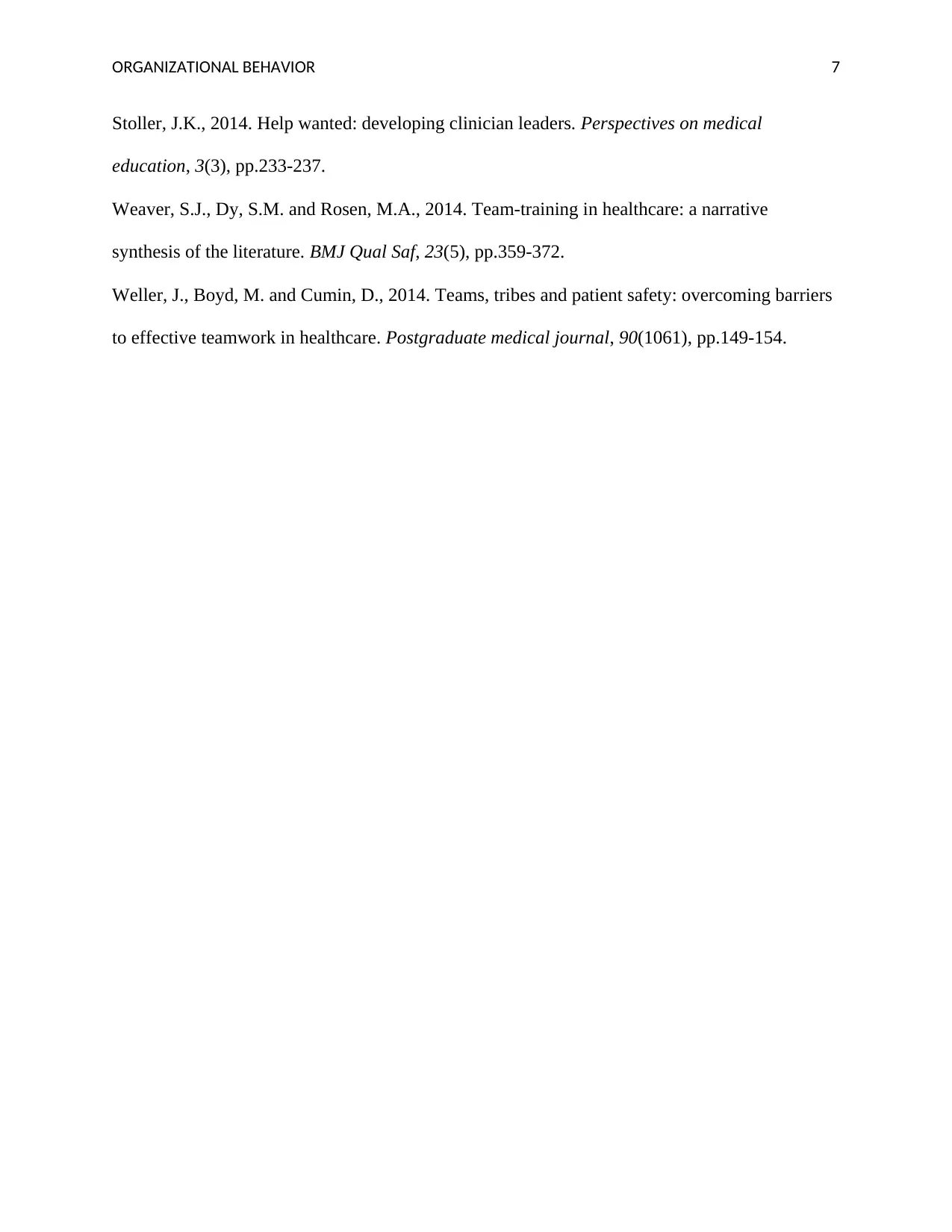
ORGANIZATIONAL BEHAVIOR 7
Stoller, J.K., 2014. Help wanted: developing clinician leaders. Perspectives on medical
education, 3(3), pp.233-237.
Weaver, S.J., Dy, S.M. and Rosen, M.A., 2014. Team-training in healthcare: a narrative
synthesis of the literature. BMJ Qual Saf, 23(5), pp.359-372.
Weller, J., Boyd, M. and Cumin, D., 2014. Teams, tribes and patient safety: overcoming barriers
to effective teamwork in healthcare. Postgraduate medical journal, 90(1061), pp.149-154.
Stoller, J.K., 2014. Help wanted: developing clinician leaders. Perspectives on medical
education, 3(3), pp.233-237.
Weaver, S.J., Dy, S.M. and Rosen, M.A., 2014. Team-training in healthcare: a narrative
synthesis of the literature. BMJ Qual Saf, 23(5), pp.359-372.
Weller, J., Boyd, M. and Cumin, D., 2014. Teams, tribes and patient safety: overcoming barriers
to effective teamwork in healthcare. Postgraduate medical journal, 90(1061), pp.149-154.
1 out of 7
Related Documents
Your All-in-One AI-Powered Toolkit for Academic Success.
+13062052269
info@desklib.com
Available 24*7 on WhatsApp / Email
![[object Object]](/_next/static/media/star-bottom.7253800d.svg)
Unlock your academic potential
Copyright © 2020–2026 A2Z Services. All Rights Reserved. Developed and managed by ZUCOL.




